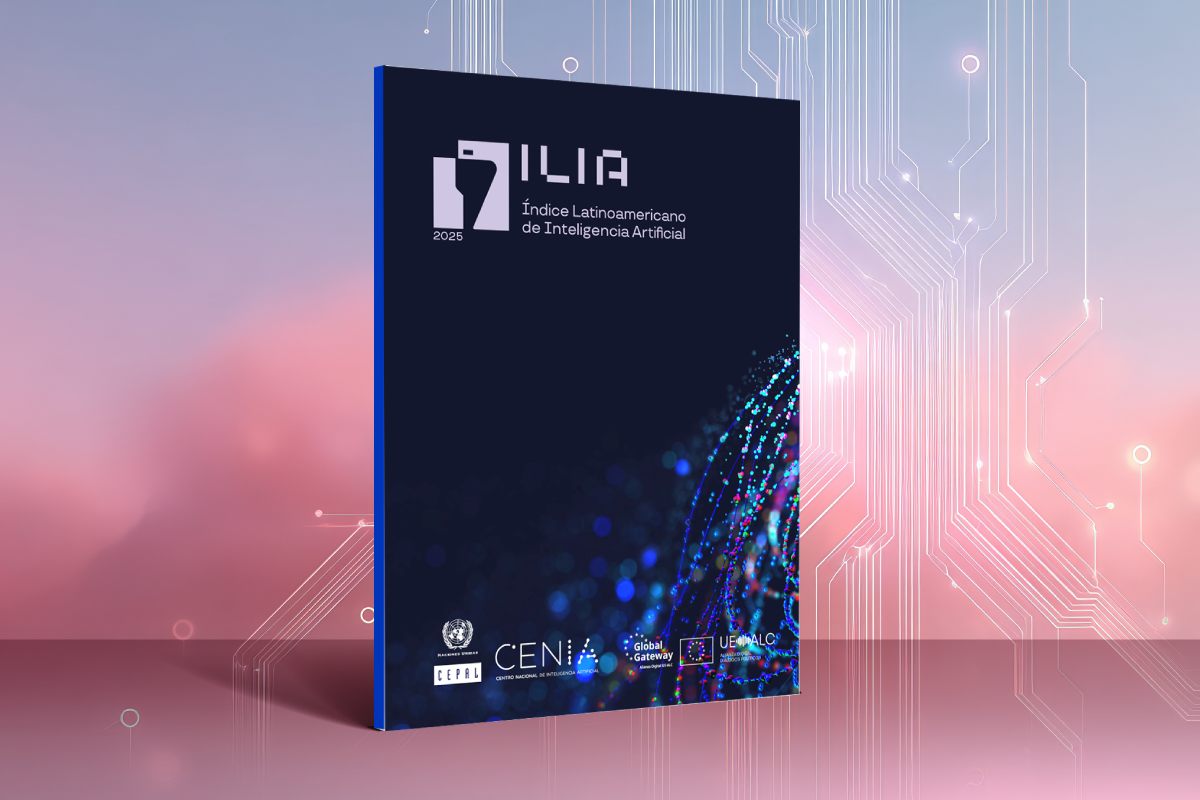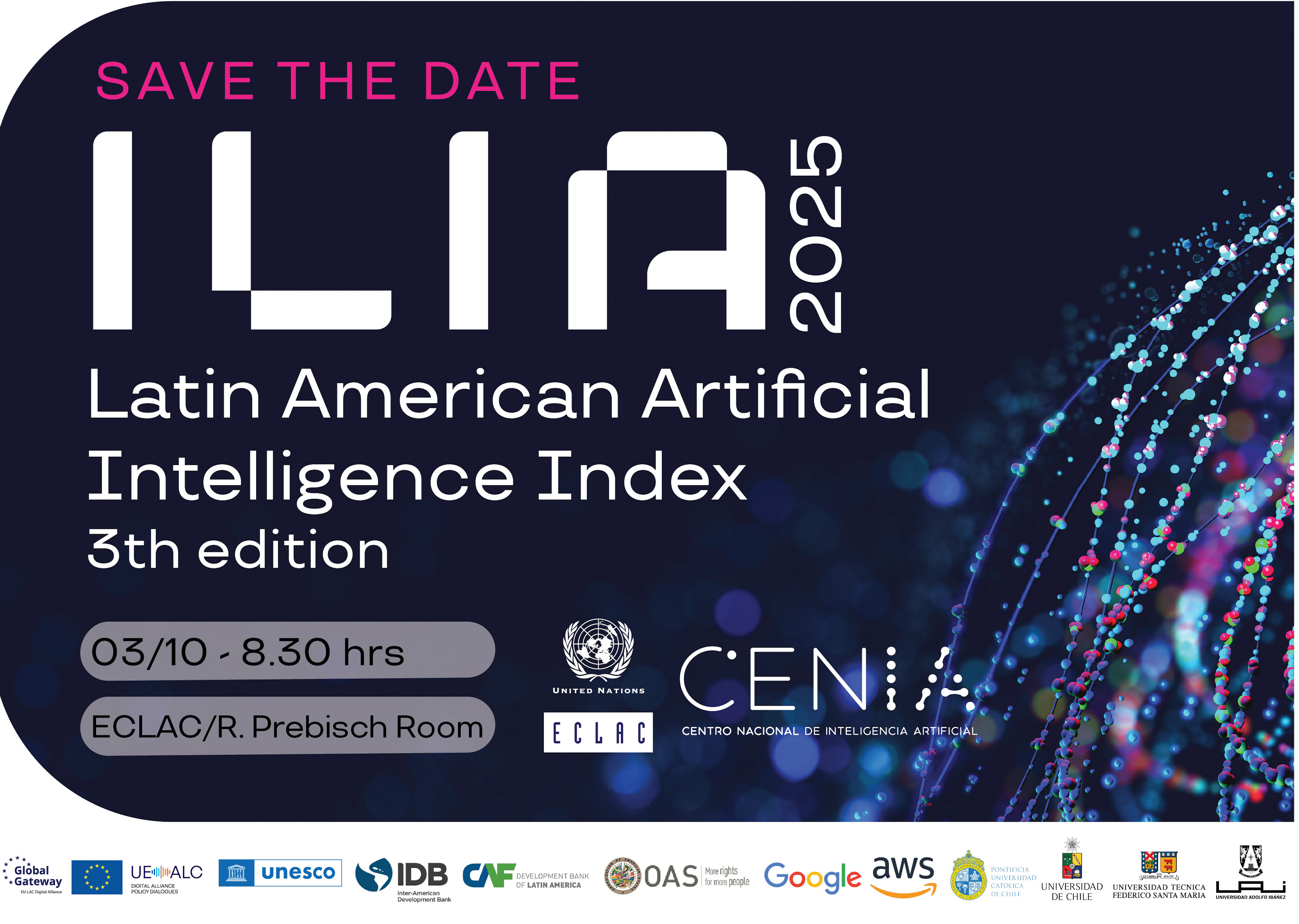Latin America and the Caribbean Accelerate the Adoption of Artificial Intelligence, though Challenges Remain in Investment, Talent, and Governance
Work area(s)
ECLAC and CENIA Chile launch the third edition of the Latin American Artificial Intelligence Index (ILIA 2025).

The Economic Commission for Latin America and the Caribbean (ECLAC) and Chile’s National Center for Artificial Intelligence (CENIA) presented the third edition of the Latin American Artificial Intelligence Index (ILIA 2025), a pioneering tool that systematically measures the level of preparedness, adoption, and governance of artificial intelligence (AI) in 19 countries of the region. Based on more than 100 sub-indicators organized into three dimensions—enabling factors; research, development and adoption; and governance—the report provides a detailed overview of the progress made and the challenges that Latin America and the Caribbean still face in this field.
The results show that the region is accelerating AI adoption, surpassing what might be expected given its digital weight. According to ECLAC estimates, Latin America and the Caribbean account for 14% of global visits to AI solutions, compared to an 11% share of the world’s internet users. However, this trend is marked by sharp contrasts across countries in the region.
ILIA groups countries into three categories according to their level of maturity: pioneers, adopters, and explorers. Chile, Brazil and Uruguay have consolidated their positions as pioneers, scoring more than 60 points on the index. Eight countries—including Colombia, Ecuador, Costa Rica and the Dominican Republic—fall into the adopter category, occupying an intermediate level and narrowing the gap with leaders thanks to improvements in connectivity, talent and national strategies. By contrast, more than one-third of the countries analyzed remain in the explorer category, with incipient ecosystems and limited capacities.
The study highlights significant structural gaps in talent, investment and governance. In particular, advanced training in AI remains insufficient and is concentrated in a small number of countries. Since 2022, the talent gap relative to the global average has widened, associated with an accelerated brain drain of specialists.
In terms of investment, Latin America and the Caribbean account for 6.6% of global GDP, but receive only 1.12% of global AI investment. This severely restricts the region’s ability to scale productive, technological and innovative initiatives, according to the report prepared with the support of the European Union–Latin America and Caribbean Digital Alliance (EU–LAC) project and several academic, public and private organizations.
The report also warns that, while a growing number of countries have developed national AI strategies, most lack financing, implementation mechanisms and impact evaluation systems, reducing the effectiveness of these policies. Furthermore, environmental and gender equality approaches are largely absent, despite their importance for sustainable and inclusive development. Policies also tend to focus on regulatory aspects, rather than consolidating a technological ecosystem to support productivity and well-being.
In summary, AI adoption in the region is concentrated in a small group of countries and is primarily oriented toward the consumption of ready-made, end-user solutions with low technical requirements. However, the growing interest in such tools creates an opportunity to democratize innovation and strengthen productivity, since AI can generate significant benefits across economies of different sizes and structures—provided there are favorable environments for innovation and entrepreneurship.
“ILIA 2025 confirms that artificial intelligence can become a driver for overcoming the development traps of Latin America and the Caribbean. But for this to happen, it is essential to align digitalization policies with productive development policies, including the digital transformation of priority sectors, in order to close infrastructure, talent, innovation and governance gaps, while also advancing regional cooperation to ensure an ethical, inclusive and responsible use of this technology,” stated José Manuel Salazar-Xirinachs, Executive Secretary of ECLAC.
He emphasized that AI adoption can contribute, among other areas, to the design of new productive strategies; democratizing access to education, health and other public services; expanding social protection; reducing gender gaps; lowering environmental pollution; promoting greener growth; and strengthening government transparency and efficiency.
For ECLAC, the Latin American Artificial Intelligence Index is an essential benchmark to guide evidence-based policymaking and to assess the implementation and progress of such policies, ensuring the development of AI that is geared toward a more productive, inclusive and sustainable future for the region, Salazar-Xirinachs added.
Álvaro Soto, ILIA Director at CENIA, explained that “while in the first editions of ILIA we focused on how prepared we were to face AI disruption, paying special attention to enabling factors, this new edition shifts toward metrics that show how the AI game is currently being played in the region and what its impacts are. For example, we incorporated studies on how AI is transforming the world of work. In addition, by producing annual reports we move from a snapshot to a motion picture of the evolution of AI in Latin America.”
The CENIA Director also noted that “countries show great interest, but no sense of urgency. Despite overwhelming evidence of AI’s positive impact on productivity, employment, quality of life and business opportunities, no change in trends is yet apparent. Beyond their relative position in ILIA, no country exceeds the world average in AI investment relative to GDP per capita, and the regional average remains six times below that threshold.”
Finally, Claudia Gintersdorfer, Ambassador of the European Union to Chile and Representative to ECLAC, stressed that “AI is consolidating as a driver of digital transformation, and that is why the European Union has supported the development of ILIA, now in its third edition. We believe this index is not only a diagnostic tool but also a roadmap—a compass to guide the region toward a transition that is fair, inclusive and people-centered.”
Related content

Third Edition of the Latin American Artificial Intelligence Index to Be Presented at ECLAC on October 3
The launch of ILIA 2025 will bring together government officials, representatives of international organizations, and leaders from the private sector and academia.
Related link(s)
Country(ies)
- Latin America and the Caribbean